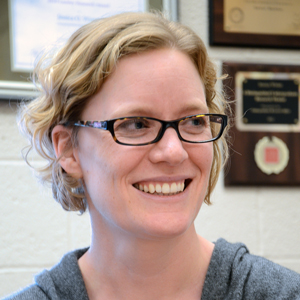
Jessica Winter
Professor of Chemical & Biomolecular Engineering and Biomedical Engineering
The Ohio State University
Chemical engineering tools to fight cancer: A bench to bedside journey
December 5
4:00–5:00 p.m.
Physics/Astronomy Auditorium A114
Abstract
One of the greatest difficulties in developing effective cancer therapies is disease heterogeneity. Molecular medicines, such as trastuzumab and erlotinib, have made tremendous inroads in therapy. However, the expression of the markers that these medicines target can vary from patient to patient and even from cell to cell. It is increasingly clear that new technologies are required to evaluate cancer chemical pathways to identify new drug targets and to match patients to those therapies (i.e., personalized medicine).
Using examples from our work, I will describe a journey of cancer therapeutic development from discovery to implementation, with a focus on the unique contributions of chemical engineers to the process. We begin our journey with discovery, and I will describe our work to identify new cancer therapeutics that target cues in the tumor microenvironment. Specifically, we are developing models that mimic chemical, mechanical, and physical features that may be found in glioma brain cancers. I will describe models that mimic increased tumor interstitial fluid pressure that we are using to identify potential mechanisms of glioma resistance to cell death.
The next step on our journey examines the challenges of drug delivery, particularly to the brain, which is limited by the blood-brain-barrier. I will describe polymeric drug carriers that our group has designed to deliver hydrophobic drugs to brain tumors. I will also describe methods to manufacture these carriers at high throughput, as would be required for clinical application.
Our journey ends by matching patients to available therapies, and I will describe our work to develop diagnostic technologies for blood and solid tumors. We developed quantum dot imaging probes for clinical translation, and I will describe our commercialization efforts through Core Quantum Technologies, a company founded by myself and former students, to get these diagnostic technologies to market. I will conclude by discussing our latest technology for pathway analysis in solid tumors. This technology combines DNA nanotechnology with nanoparticle imaging agents for an erasable histopathology approach.
Bio
Jessica Winter is a Distinguished Professor of Engineering in the William G. Lowrie Department of Chemical and Biomolecular Engineering and the Department of Biomedical Engineering at Ohio State University. Winter is also a past Chair of the Chemical Engineering Technical Operating Council (CTOC) of the American Institute of Chemical Engineers (AIChE).
She received her Ph.D. in Chemical Engineering from the University of Texas at Austin in 2004 and completed a postdoctoral fellowship at the Center for Innovative Visual Rehabilitation at the Boston VA Hospital in 2006. Her research interests include nanoparticles for cancer imaging, diagnostics, and drug delivery, as well as cell migration in the brain tumor microenvironment.
She is a co-founder and Chief Scientific Officer of Core Quantum Technologies, a company commercializing nanoparticle reagents for cancer diagnostics. She was named TechColumbus Innovator of the Year, Columbus Business First 40 under 40, and Columbus Business First 20 People to Know in Technology. She has received the American Physical Society (APS) Five Sigma Award, American Chemical Society (ACS) Rising Star Award, and the Engineering DesignNews Golden Mouse Trap Rising Star Award. Winter was also among the Top 25 STEM professors in Ohio and is a fellow of the AIChE, BMES, AAAS, AIMBE, the RSC, as well as a senior member of the IEEE.